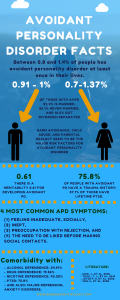What is Avoidant Personality Disorder?
Avoidant personality disorder (AVPD) is a real and serious mood disorder. Most of AVPD is caused by trauma. Some of the key ways to tell if you have avoidant personality disorder is:
- continued feelings of inadequacy
- extreme fear of being rejected, ridiculed, disliked or criticized
- feeling socially inept or awkward even though you may not be
- choosing to keep out of social activities, like meeting with friends
- avoiding to go to work because you feel insecure or inadequate compared to co-workers
- wanting to be liked by others
- preoccupation with rejection
An AVPD person wants love but gets ridicule
A person with AVPD wants love but gets ridicule instead.
When a person who has avoidant personality disorder meets other people, he or she will usually feel insecure and tense, which makes anything he or she does awkward. That makes the AVPD person a prime target for ridicule because the person is seen as acting odd, wierd or out of place. Sadly, such ridicule leaves the AVPD person even more terrified of people.
But while AVPD makes the person want to avoid others, at the same time there is an intense need and desire to be loved or liked. It’s a double edged sword. The AVPD person craves love and acceptance. Any rejection therefore is cause of great despair. Which makes the AVPD person then ruminate over the rejection and want to be loved and accepted even more.
How to treat avoidant personality disorder
Treating AVPD takes time. And treatment is always slow.
The biggest hurdle is the patient-therapist relationship. Getting an AVPD person to trust his or her therapist takes lots of time, and even if there is some opening up by the AVPD person, there’s always a question of how much the AVPD person actually trusts the therapist.
Most therapist focus on improving the AVPD person’s interactions with other people. A therapist will look at improving social interactions and intimate relationships. One way of to do this is by first dealing with the traumatic event that created the AVPD. If a therapist can get some closure on the trauma or healing started, then the next step is to improve the person’s self-esteem.
Any cures for avoidant personality disorder?
Sadly, the answer is no. There is no cure for AVPD. But there are ways to control it.
Cognitive behavioural therapy is one of the more common ways to get this accomplished. CBT monitors beliefs and looks at what is real and what is imagined or assumed. Mindfulness therapy falls into this category.
Another way of treating AVPD is medication. However, at this time there is no medication that cures AVPD. The medications that are used are anti-depressants and anti-anxiety tablets that only help settle a person’s anxieties. But these meds only work short term.


